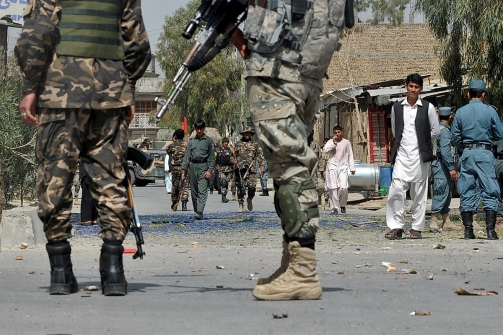Daily Beast: Michael Ware on Sgt. Robert Bales, Accused of Killing Afghan Civilians

More than a week after the U.S. soldier’s alleged massacre, there is still no answer to the “why” of this abomination. But war correspondent Michael Ware says after all the tours Staff Sgt. Bales endured, he must have some form of PTSD—and a terrible void within.
I still remember the night in Iraq when we shot and killed someone’s grandmother. I say “we” even though I did not pull the trigger, nor was I even carrying a weapon. But when you’re present at such a thing, when you’re a part of those who’ve come and delivered death, a shadow passes over you. In an odd, muted way the hurt of it bleeds inside you too.
No one was to blame. Innocence resides on both sides of that 2006 night. These are simply the things of war, things for which your heart becomes a dark and lasting harbor.
It was in a village beside the Euphrates River, outside of that combat-ruined city of Ramadi, then the capital of al Qaeda’s self-proclaimed Islamic State of Iraq. The sleepy rural area, green and vibrant, and fed, in a land of endless desert, by the snaking river, was part of a swath of territory housing al Qaeda’s command and control centers, and said to be the domain of the organization’s national headquarters, from whence the group’s particular breed of misery spread across the entire country.
Fresh intelligence had it that this village was one in a small cluster in which key al Qaeda commanders regularly bedded down. As best as such guerrilla wars allow, the information was vetted and checked and calibrated to the greatest, most honest degrees. That it would soon prove false, most likely fed by the same al Qaeda leaders the mission sought to kill or capture, has little, if any, meaning today. Only in the old woman’s death does this one operation for me rise above some of the hundreds of others I joined, or the thousands conducted throughout the conflict.
U.S. military units moved to and isolated the hamlet from three sides, by air assault and convoy on land and, somewhat remarkably, by water in fast-moving gunboats along the river. From hazy, shadowed memory, the shooter was a soldier among us who landed ashore and advanced silently across hundreds of yards of open field until we reached upon the village fringe.
It was one of those wretchedly hot, late-summer Iraqi nights, when families often slept on their balconied rooftops, drowsing on metal bed frames, or blanketed mats aligned on the concrete. They must have heard the commotion as the dozens of heavily armed troops first entered the village and then began cracking doors, searching building by building.

Jangir / AFP / Getty Images
The head of this family, atop his roof with the rest, poked his head gingerly above the parapet, fearing the worst. He could see only the inky silhouettes of armed men moving below. From the first he suspected they were Americans, and not a more malign force, but he had to check, popping back up for a breathless moment more. He whispered to his family it was indeed Americans. But his elderly wife took an instant to see for herself, popping up her head just as her husband had done.
To the soldier some distance away in the night, through the misty green view of night vision goggles, it looked to be a bobbing head, “turkey peeking” as it’s dubbed, when enemy fighters are furtively glancing to range or locate their targets. One peek is often an innocent, wanting to know what approaches. A more daring second peek arouses suspicion. A third peek, well, that strikes many soldiers as more than suspicious. So the soldier held his aim and squeezed the trigger, his high velocity round piercing the grandmother’s skull.
In the minutes it took us to reach the house, the family had moved down to the living room, the grandmother laid out in the room’s center and covered with a veil. Three or four generations were crouched around her, wailing and weeping, some clawing at her still body. Worse still, somehow, was a shrieking baby, held aloft in a young father’s arms, blood coursing from the child’s behind. A fragment of the bullet had cut a wound, and the soldiers cried out for a medic who came rushing and tenderly administered aid in the poor dim light.
“Second to losing one of our own,” the platoon’s officer told me outside on the grass, killing a civilian is “probably one of the hardest things that happen to us. It’ll be a big blow.”
After three bloody tours of Iraq and a fourth in Afghanistan, most soldiers would be carrying any number of such big blows, and I wonder what shreds at the soul of Robert Bales, accused of committing the Panjwaii massacre of 16 civilians, nine of them children, might have dwelling inside him.
None of which would pardon nor condone the butchery he is said to have unleashed. It’s a vision of horror I cannot get out of my head: a killer wretchedly moving from abode to abode, wantonly executing children standing or lying before him.
Early reports suggest that Staff Sgt. Bales returned to his base after the alleged killings and promptly turned himself in, almost immediately volunteering what he had done. But the question remains: if indeed he is guilty, why would a 38-year-old father of two, a man who signed up to fight for his country, do such a thing?
Since 9/11, more than 107,000 soldiers have completed three or more combat tours, and studies show that up to about 30 percent of combat vets returning home report some kind of posttraumatic stress disorder. As a sufferer myself, I find it hard to believe that Bales, after all the tours he’s endured, would not have some form of PTSD. But even if that is so, that alone is not any kind of explanation.
It was a Medal of Honor winner from Vietnam who said that given what we must see in war, given what soldiers must do, one would have to be almost a sociopath for these things not to touch you, irrevocably, for the rest of your life. The killing of the Iraqi grandmother is one, but not the worst or most haunting, in my accumulation of horrors from the wars in Iraq and Afghanistan.
While our troops go out of their way, even adding great risk to their own lives to prevent it, the killing of civilians does still happen. Many of us who have experienced the fighting over these long years have seen it for ourselves—be it from the lighting up of errant vehicles at checkpoints, or tossing grenades into structures to silence a well-used weapon, or from the ubiquitously named collateral damage when we drop our bombs or are forced to blast our way out of ambush killing zones.
People may come to be seen as chattel, once you’ve stepped over enough body parts, picked up enough dying mates, and embraced that mind-set required to be purveyors of death in foreign lands. In that odiously dark place where our young men have to go in their heads to endure and survive and carry out the ugly deeds demanded of them in combat, these things must take their seat. Human life comes to hold both a greater and a lesser value than it might hold in a peaceful civilian world.
It’s taken me a full, sleepless week to pen this since first hearing of the shootings in Panjwaii; all this time to turn that image of the shooter in my head, to fathom any of my reaction to it. There is still no answer to the “why” of this abomination. But a beating heart must, by human necessity, assume he is possessed of a terrible and consuming emptiness within. If Bales's guilt is true, his soul must surely be a dark, lightless place.
